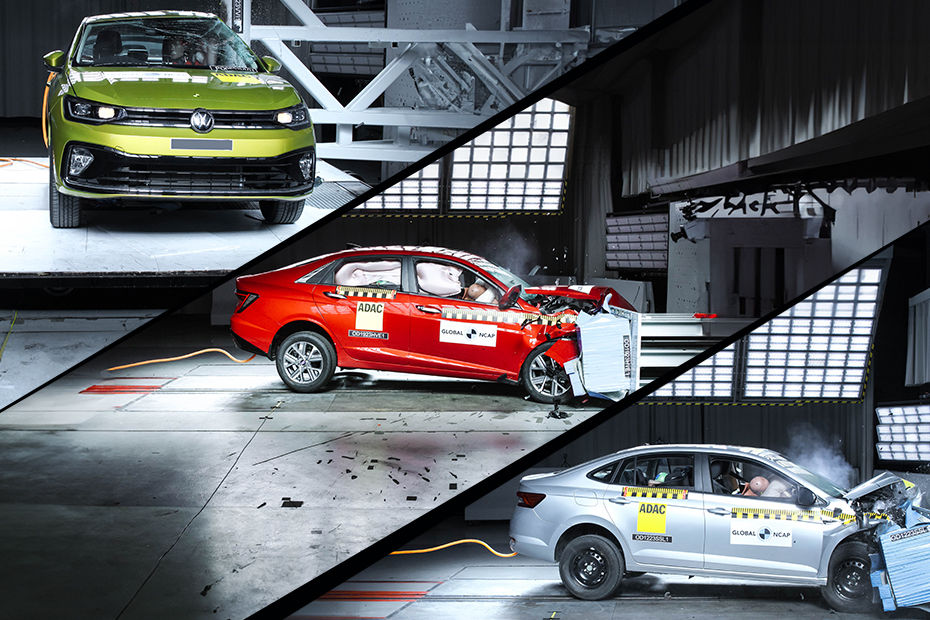2023 Hyundai Verna vs Skoda Slavia vs Volkswagen Virtus: Global NCAP Scores Compared
Modified On Oct 04, 2023 05:38 PM By Rohit
- Write a comment
All three sedans have achieved a 5-star score in both adult and child occupant protection, but two of them have one big advantage in the form of a better rating for the bodyshell

The Global NCAP has been responsible for crash testing a lot of India-specific models for close to a decade now. Although it will stop conducting crash tests from 2024 with the introduction of the Bharat NCAP, it recently released the result of the made-in-India Hyundai Verna. It was the first made-in-India Hyundai to get a 5-star score.
With the Hyundai sedan achieving a top rating, we decided to compare its results with those of two popular sedans from its segment, the Skoda Slavia and Volkswagen Virtus. Just like all the other cars, their base variants have been taken into consideration. Here are our observations:
Overall Scores
| Parameter |
2023 Hyundai Verna |
Skoda Slavia |
Volkswagen Virtus |
| Adult occupant protection |
28.18 out of 34 points (5 stars) |
29.71 out of 34 points (5 stars) |
29.71 out of 34 points (5 stars) |
| Child occupant protection |
42 out of 49 points (5 stars) |
42 out of 49 points (5 stars) |
42 out of 49 points (5 stars) |
While all three sedans here have been certified with a 5-star rating in both adult and child occupant protection, it’s the Skoda-VW duo that has an edge in the former by way of more points. That said, the new Hyundai Verna has matched the German sedans in terms of points bagged in child occupant protection.

Of the trio, it’s only the Verna that gets six airbags as standard. That said, all three carmakers have equipped their models with standard safety features such as 3-point seatbelts and electronic stability control (ESC).
ADULT OCCUPANT PROTECTION
 Hyundai Verna result
Hyundai Verna result
Although the Verna equalled the Virtus and Slavia’s 5-star safety rating in adult occupant protection, it got 28.18 out of 34 points while the German sedans have a score of 29.71 points.
 Skoda Slavia and Volkswagen Virtus result
Skoda Slavia and Volkswagen Virtus result
Frontal Impact: The German duo demonstrated good protection to the head, neck, driver’s thighs, and co-passengers’ legs. The chest region of both the front passengers received adequate protection.
Even the Verna offered good protection to the driver and passenger’s head and neck. While protection to the driver’s chest was rated ‘marginal,’ the passenger’s chest received ‘good’ protection. The driver and passenger’s knees showed ‘marginal’ protection.

Side Impact, Side Pole Impact And ESC: In the Verna, protection to the head, abdomen and pelvis was stated to be ‘good’ but that for the chest was stated as ‘adequate.’ Its German rivals, on the other hand, offered good protection to the pelvis area while the head, chest, and abdomen areas were adequately protected.

In the side pole impact test of the Verna, the head and pelvis got ‘good’ protection from the curtain airbag, while ‘marginal’ cover was provided to the chest and ‘adequate’ protection to the abdomen. The result also mentioned that the fitment of the curtain airbags for the side impact pole test was as per the required protocols. The Slavia and Virtus showed good protection for the head, neck, and pelvis area, but marginal protection for the chest.
All three sedans met the fitment rate requirements for ESC, and the performance shown in the test was acceptable according to Global NCAP’s newest requirements.
Also Read: Skoda Slavia And Skoda Kushaq Starting Prices Reduced This Festive Season
CHILD OCCUPANT PROTECTION
The Verna, with a score of 42 out of 49 points, came at par with the German sedans in terms of child occupant safety.
In the Hyundai sedan, the child seat for the 3-year old was installed facing rearward and it managed to prevent head exposure during the frontal impact and offered full protection. On the other hand, the child seat for the 1.5-year-old dummy was also facing rearward and it was able to provide full protection to the head too.

In the Slavia and Virtus, the 3-year-old and 18-month-old dummies were seated on rearward facing ISOFIX seats, offering complete protection during frontal and side impact.
Bodyshell Integrity
The last but most significant parameter of the GNCAP crash test is the bodyshell integrity. Here, the results tilt in favour of the Slavia and Virtus as their bodyshell was rated ‘stable’ and capable of withstanding further loadings, whereas that of the new Verna was deemed ‘unstable’ in the front offset crash test.
Also Read: These Are The 5 More Affordable Cars In India With ADAS
Takeaway
While all three models come neck and neck in terms of their performance in the Global NCAP crash tests, the German models do have an edge over the Hyundai Verna. That’s down to the slightly better points in adult occupant protection, but the main talking point is the stability of their bodyshell. That said, the Verna is the only model here to have six airbags as standard and to offer advanced driver assistance systems (ADAS) in its higher variants. We expect more Hyundai cars to fare better in the upcoming crash test assessments with the carmaker having now made six airbags a standard offering across its Indian lineup.
Read More on : Verna on road price
3 out of 3 found this helpful















